Analyzing Tourism and Society: Sociological Practices & Theories
VerifiedAdded on 2023/06/04
|8
|2586
|217
Essay
AI Summary
This essay provides a comprehensive overview of the relationship between tourism and society, exploring various sociological practices, theories, and principles. It investigates how political, socio-cultural, and economic contexts influence sustainability in tourism. The report delves into the interdependence and interactions of individuals, processes, and places within the tourism industry, highlighting the importance of tourism development for both society and the industry's future. It defines sociology and discusses the social science of travel and its connection to society, covering topics such as social tourism, tourism development, the tourism life cycle, Leiper's Tourism System, push and pull influences, and stakeholder management. The essay also addresses the positive and negative impacts of tourism on society, including economic, environmental, and socio-cultural factors, and concludes by emphasizing the importance of sustainable tourism practices and understanding consumer expectations in the evolving travel industry.
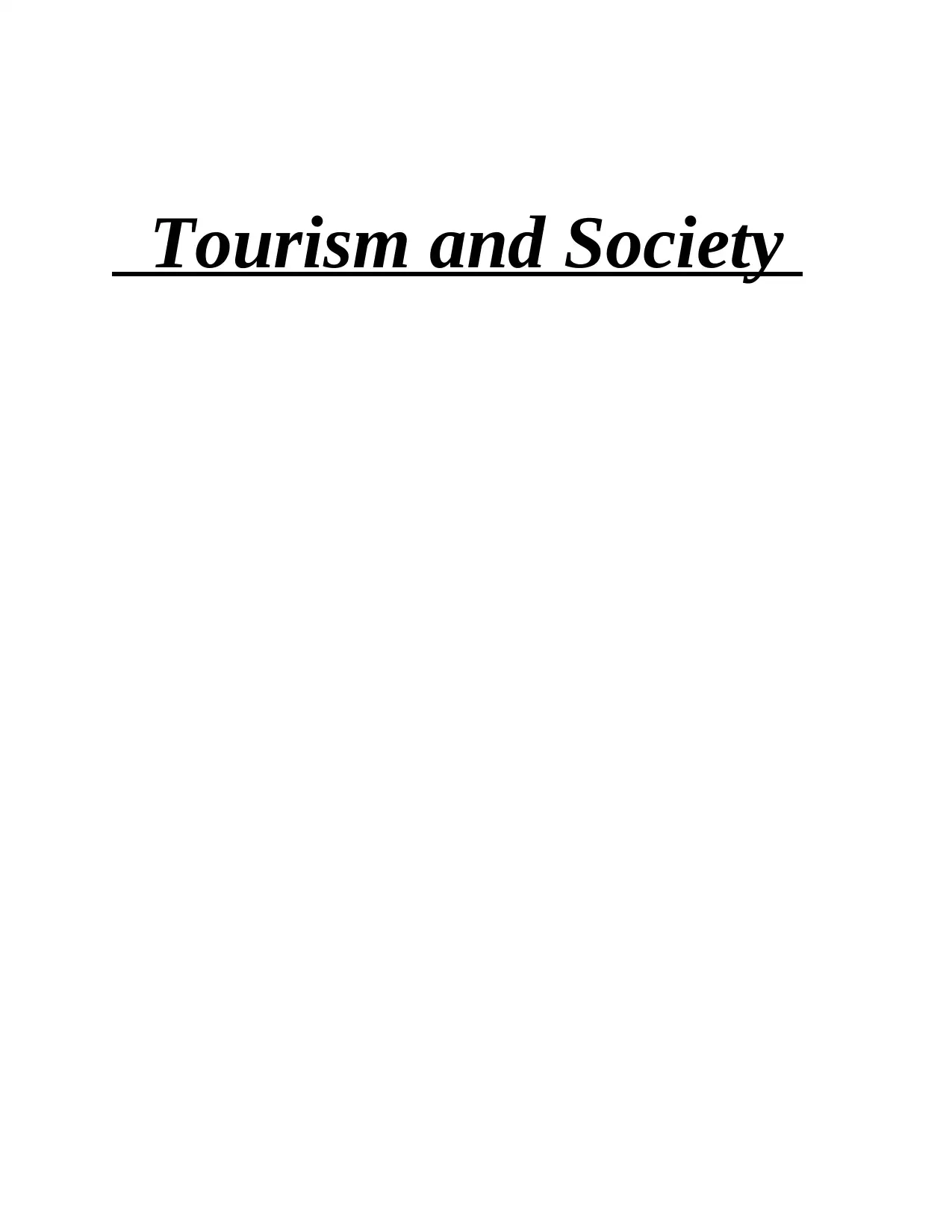
Tourism and Society
Paraphrase This Document
Need a fresh take? Get an instant paraphrase of this document with our AI Paraphraser
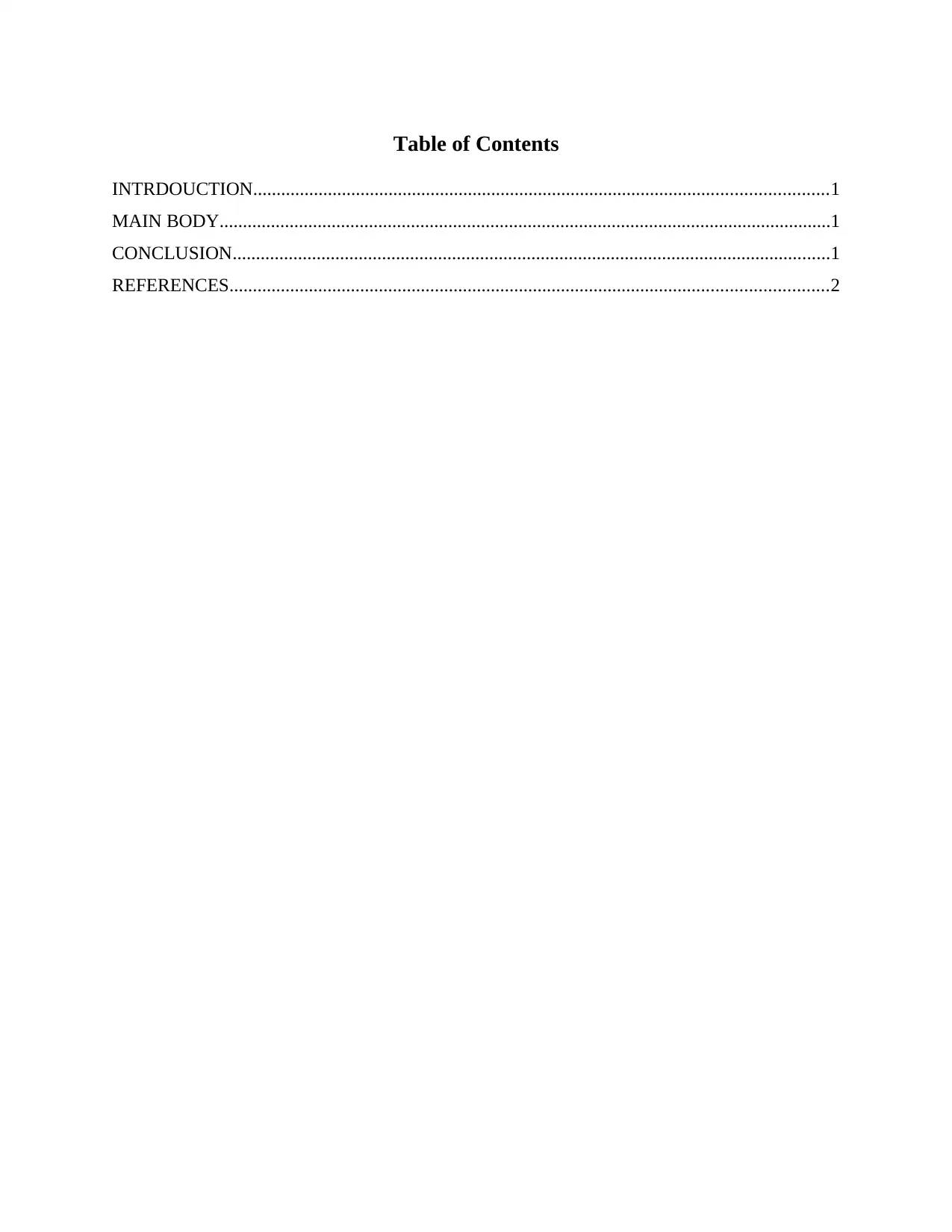
Table of Contents
INTRDOUCTION...........................................................................................................................1
MAIN BODY...................................................................................................................................1
CONCLUSION................................................................................................................................1
REFERENCES................................................................................................................................2
INTRDOUCTION...........................................................................................................................1
MAIN BODY...................................................................................................................................1
CONCLUSION................................................................................................................................1
REFERENCES................................................................................................................................2
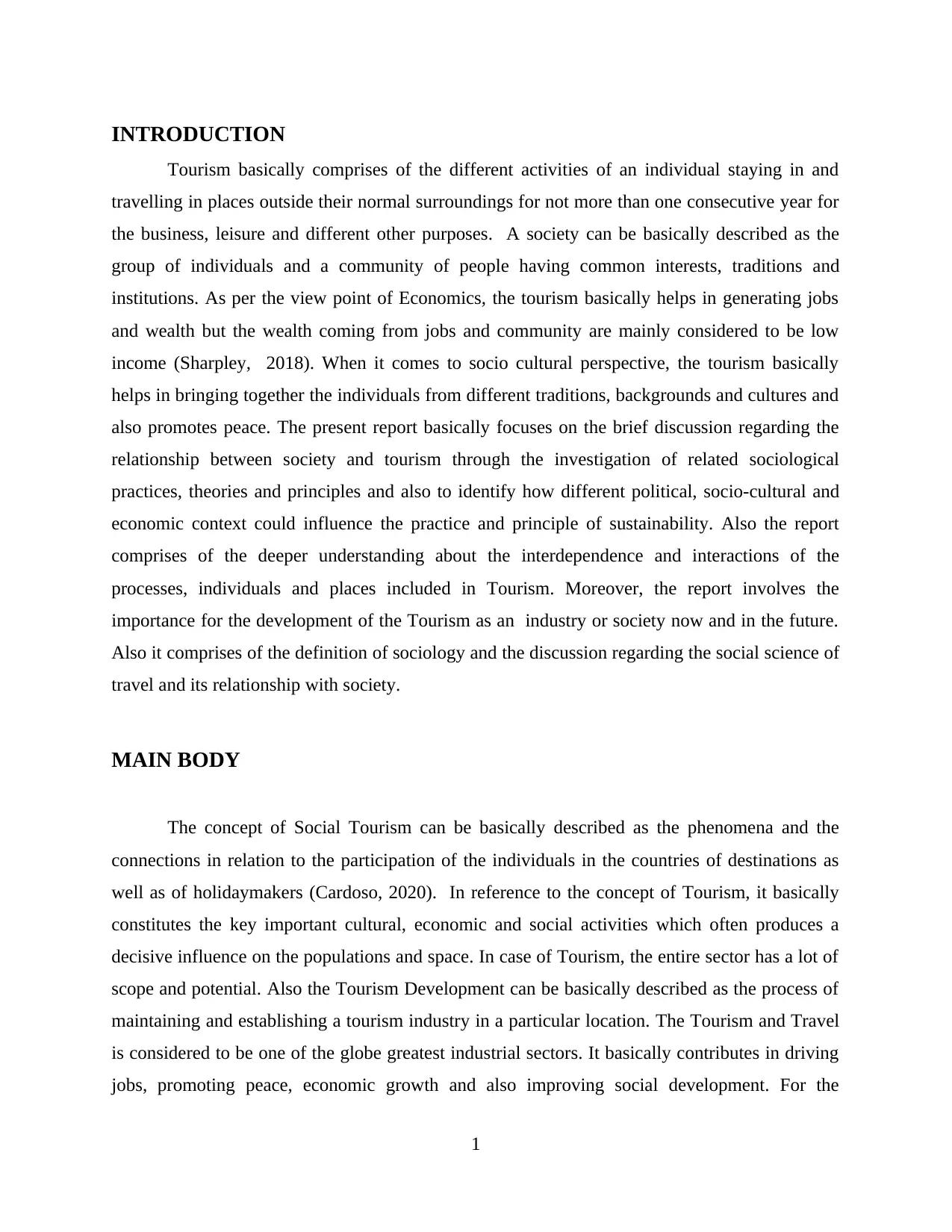
INTRODUCTION
Tourism basically comprises of the different activities of an individual staying in and
travelling in places outside their normal surroundings for not more than one consecutive year for
the business, leisure and different other purposes. A society can be basically described as the
group of individuals and a community of people having common interests, traditions and
institutions. As per the view point of Economics, the tourism basically helps in generating jobs
and wealth but the wealth coming from jobs and community are mainly considered to be low
income (Sharpley, 2018). When it comes to socio cultural perspective, the tourism basically
helps in bringing together the individuals from different traditions, backgrounds and cultures and
also promotes peace. The present report basically focuses on the brief discussion regarding the
relationship between society and tourism through the investigation of related sociological
practices, theories and principles and also to identify how different political, socio-cultural and
economic context could influence the practice and principle of sustainability. Also the report
comprises of the deeper understanding about the interdependence and interactions of the
processes, individuals and places included in Tourism. Moreover, the report involves the
importance for the development of the Tourism as an industry or society now and in the future.
Also it comprises of the definition of sociology and the discussion regarding the social science of
travel and its relationship with society.
MAIN BODY
The concept of Social Tourism can be basically described as the phenomena and the
connections in relation to the participation of the individuals in the countries of destinations as
well as of holidaymakers (Cardoso, 2020). In reference to the concept of Tourism, it basically
constitutes the key important cultural, economic and social activities which often produces a
decisive influence on the populations and space. In case of Tourism, the entire sector has a lot of
scope and potential. Also the Tourism Development can be basically described as the process of
maintaining and establishing a tourism industry in a particular location. The Tourism and Travel
is considered to be one of the globe greatest industrial sectors. It basically contributes in driving
jobs, promoting peace, economic growth and also improving social development. For the
1
Tourism basically comprises of the different activities of an individual staying in and
travelling in places outside their normal surroundings for not more than one consecutive year for
the business, leisure and different other purposes. A society can be basically described as the
group of individuals and a community of people having common interests, traditions and
institutions. As per the view point of Economics, the tourism basically helps in generating jobs
and wealth but the wealth coming from jobs and community are mainly considered to be low
income (Sharpley, 2018). When it comes to socio cultural perspective, the tourism basically
helps in bringing together the individuals from different traditions, backgrounds and cultures and
also promotes peace. The present report basically focuses on the brief discussion regarding the
relationship between society and tourism through the investigation of related sociological
practices, theories and principles and also to identify how different political, socio-cultural and
economic context could influence the practice and principle of sustainability. Also the report
comprises of the deeper understanding about the interdependence and interactions of the
processes, individuals and places included in Tourism. Moreover, the report involves the
importance for the development of the Tourism as an industry or society now and in the future.
Also it comprises of the definition of sociology and the discussion regarding the social science of
travel and its relationship with society.
MAIN BODY
The concept of Social Tourism can be basically described as the phenomena and the
connections in relation to the participation of the individuals in the countries of destinations as
well as of holidaymakers (Cardoso, 2020). In reference to the concept of Tourism, it basically
constitutes the key important cultural, economic and social activities which often produces a
decisive influence on the populations and space. In case of Tourism, the entire sector has a lot of
scope and potential. Also the Tourism Development can be basically described as the process of
maintaining and establishing a tourism industry in a particular location. The Tourism and Travel
is considered to be one of the globe greatest industrial sectors. It basically contributes in driving
jobs, promoting peace, economic growth and also improving social development. For the
1
⊘ This is a preview!⊘
Do you want full access?
Subscribe today to unlock all pages.

Trusted by 1+ million students worldwide
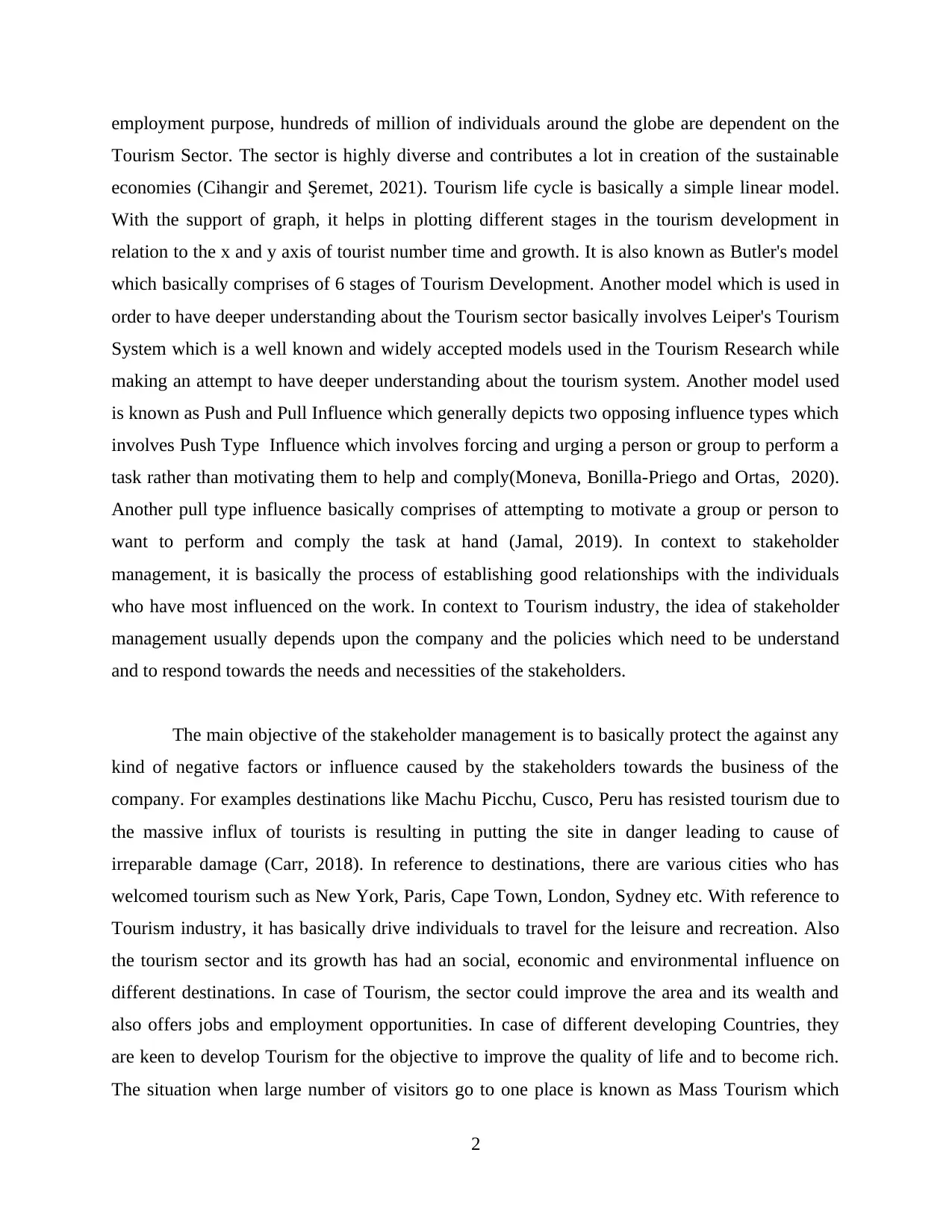
employment purpose, hundreds of million of individuals around the globe are dependent on the
Tourism Sector. The sector is highly diverse and contributes a lot in creation of the sustainable
economies (Cihangir and Şeremet, 2021). Tourism life cycle is basically a simple linear model.
With the support of graph, it helps in plotting different stages in the tourism development in
relation to the x and y axis of tourist number time and growth. It is also known as Butler's model
which basically comprises of 6 stages of Tourism Development. Another model which is used in
order to have deeper understanding about the Tourism sector basically involves Leiper's Tourism
System which is a well known and widely accepted models used in the Tourism Research while
making an attempt to have deeper understanding about the tourism system. Another model used
is known as Push and Pull Influence which generally depicts two opposing influence types which
involves Push Type Influence which involves forcing and urging a person or group to perform a
task rather than motivating them to help and comply(Moneva, Bonilla-Priego and Ortas, 2020).
Another pull type influence basically comprises of attempting to motivate a group or person to
want to perform and comply the task at hand (Jamal, 2019). In context to stakeholder
management, it is basically the process of establishing good relationships with the individuals
who have most influenced on the work. In context to Tourism industry, the idea of stakeholder
management usually depends upon the company and the policies which need to be understand
and to respond towards the needs and necessities of the stakeholders.
The main objective of the stakeholder management is to basically protect the against any
kind of negative factors or influence caused by the stakeholders towards the business of the
company. For examples destinations like Machu Picchu, Cusco, Peru has resisted tourism due to
the massive influx of tourists is resulting in putting the site in danger leading to cause of
irreparable damage (Carr, 2018). In reference to destinations, there are various cities who has
welcomed tourism such as New York, Paris, Cape Town, London, Sydney etc. With reference to
Tourism industry, it has basically drive individuals to travel for the leisure and recreation. Also
the tourism sector and its growth has had an social, economic and environmental influence on
different destinations. In case of Tourism, the sector could improve the area and its wealth and
also offers jobs and employment opportunities. In case of different developing Countries, they
are keen to develop Tourism for the objective to improve the quality of life and to become rich.
The situation when large number of visitors go to one place is known as Mass Tourism which
2
Tourism Sector. The sector is highly diverse and contributes a lot in creation of the sustainable
economies (Cihangir and Şeremet, 2021). Tourism life cycle is basically a simple linear model.
With the support of graph, it helps in plotting different stages in the tourism development in
relation to the x and y axis of tourist number time and growth. It is also known as Butler's model
which basically comprises of 6 stages of Tourism Development. Another model which is used in
order to have deeper understanding about the Tourism sector basically involves Leiper's Tourism
System which is a well known and widely accepted models used in the Tourism Research while
making an attempt to have deeper understanding about the tourism system. Another model used
is known as Push and Pull Influence which generally depicts two opposing influence types which
involves Push Type Influence which involves forcing and urging a person or group to perform a
task rather than motivating them to help and comply(Moneva, Bonilla-Priego and Ortas, 2020).
Another pull type influence basically comprises of attempting to motivate a group or person to
want to perform and comply the task at hand (Jamal, 2019). In context to stakeholder
management, it is basically the process of establishing good relationships with the individuals
who have most influenced on the work. In context to Tourism industry, the idea of stakeholder
management usually depends upon the company and the policies which need to be understand
and to respond towards the needs and necessities of the stakeholders.
The main objective of the stakeholder management is to basically protect the against any
kind of negative factors or influence caused by the stakeholders towards the business of the
company. For examples destinations like Machu Picchu, Cusco, Peru has resisted tourism due to
the massive influx of tourists is resulting in putting the site in danger leading to cause of
irreparable damage (Carr, 2018). In reference to destinations, there are various cities who has
welcomed tourism such as New York, Paris, Cape Town, London, Sydney etc. With reference to
Tourism industry, it has basically drive individuals to travel for the leisure and recreation. Also
the tourism sector and its growth has had an social, economic and environmental influence on
different destinations. In case of Tourism, the sector could improve the area and its wealth and
also offers jobs and employment opportunities. In case of different developing Countries, they
are keen to develop Tourism for the objective to improve the quality of life and to become rich.
The situation when large number of visitors go to one place is known as Mass Tourism which
2
Paraphrase This Document
Need a fresh take? Get an instant paraphrase of this document with our AI Paraphraser
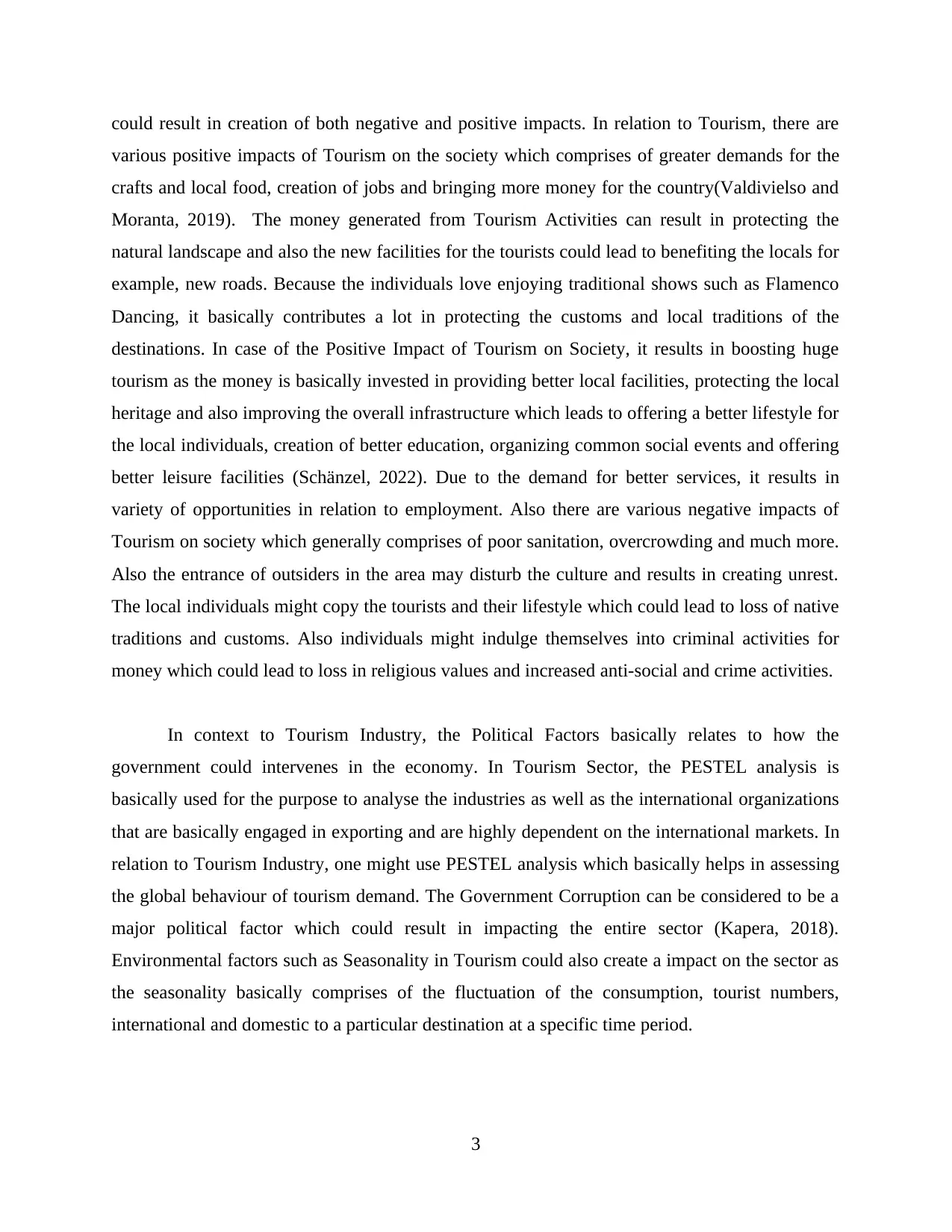
could result in creation of both negative and positive impacts. In relation to Tourism, there are
various positive impacts of Tourism on the society which comprises of greater demands for the
crafts and local food, creation of jobs and bringing more money for the country(Valdivielso and
Moranta, 2019). The money generated from Tourism Activities can result in protecting the
natural landscape and also the new facilities for the tourists could lead to benefiting the locals for
example, new roads. Because the individuals love enjoying traditional shows such as Flamenco
Dancing, it basically contributes a lot in protecting the customs and local traditions of the
destinations. In case of the Positive Impact of Tourism on Society, it results in boosting huge
tourism as the money is basically invested in providing better local facilities, protecting the local
heritage and also improving the overall infrastructure which leads to offering a better lifestyle for
the local individuals, creation of better education, organizing common social events and offering
better leisure facilities (Schänzel, 2022). Due to the demand for better services, it results in
variety of opportunities in relation to employment. Also there are various negative impacts of
Tourism on society which generally comprises of poor sanitation, overcrowding and much more.
Also the entrance of outsiders in the area may disturb the culture and results in creating unrest.
The local individuals might copy the tourists and their lifestyle which could lead to loss of native
traditions and customs. Also individuals might indulge themselves into criminal activities for
money which could lead to loss in religious values and increased anti-social and crime activities.
In context to Tourism Industry, the Political Factors basically relates to how the
government could intervenes in the economy. In Tourism Sector, the PESTEL analysis is
basically used for the purpose to analyse the industries as well as the international organizations
that are basically engaged in exporting and are highly dependent on the international markets. In
relation to Tourism Industry, one might use PESTEL analysis which basically helps in assessing
the global behaviour of tourism demand. The Government Corruption can be considered to be a
major political factor which could result in impacting the entire sector (Kapera, 2018).
Environmental factors such as Seasonality in Tourism could also create a impact on the sector as
the seasonality basically comprises of the fluctuation of the consumption, tourist numbers,
international and domestic to a particular destination at a specific time period.
3
various positive impacts of Tourism on the society which comprises of greater demands for the
crafts and local food, creation of jobs and bringing more money for the country(Valdivielso and
Moranta, 2019). The money generated from Tourism Activities can result in protecting the
natural landscape and also the new facilities for the tourists could lead to benefiting the locals for
example, new roads. Because the individuals love enjoying traditional shows such as Flamenco
Dancing, it basically contributes a lot in protecting the customs and local traditions of the
destinations. In case of the Positive Impact of Tourism on Society, it results in boosting huge
tourism as the money is basically invested in providing better local facilities, protecting the local
heritage and also improving the overall infrastructure which leads to offering a better lifestyle for
the local individuals, creation of better education, organizing common social events and offering
better leisure facilities (Schänzel, 2022). Due to the demand for better services, it results in
variety of opportunities in relation to employment. Also there are various negative impacts of
Tourism on society which generally comprises of poor sanitation, overcrowding and much more.
Also the entrance of outsiders in the area may disturb the culture and results in creating unrest.
The local individuals might copy the tourists and their lifestyle which could lead to loss of native
traditions and customs. Also individuals might indulge themselves into criminal activities for
money which could lead to loss in religious values and increased anti-social and crime activities.
In context to Tourism Industry, the Political Factors basically relates to how the
government could intervenes in the economy. In Tourism Sector, the PESTEL analysis is
basically used for the purpose to analyse the industries as well as the international organizations
that are basically engaged in exporting and are highly dependent on the international markets. In
relation to Tourism Industry, one might use PESTEL analysis which basically helps in assessing
the global behaviour of tourism demand. The Government Corruption can be considered to be a
major political factor which could result in impacting the entire sector (Kapera, 2018).
Environmental factors such as Seasonality in Tourism could also create a impact on the sector as
the seasonality basically comprises of the fluctuation of the consumption, tourist numbers,
international and domestic to a particular destination at a specific time period.
3
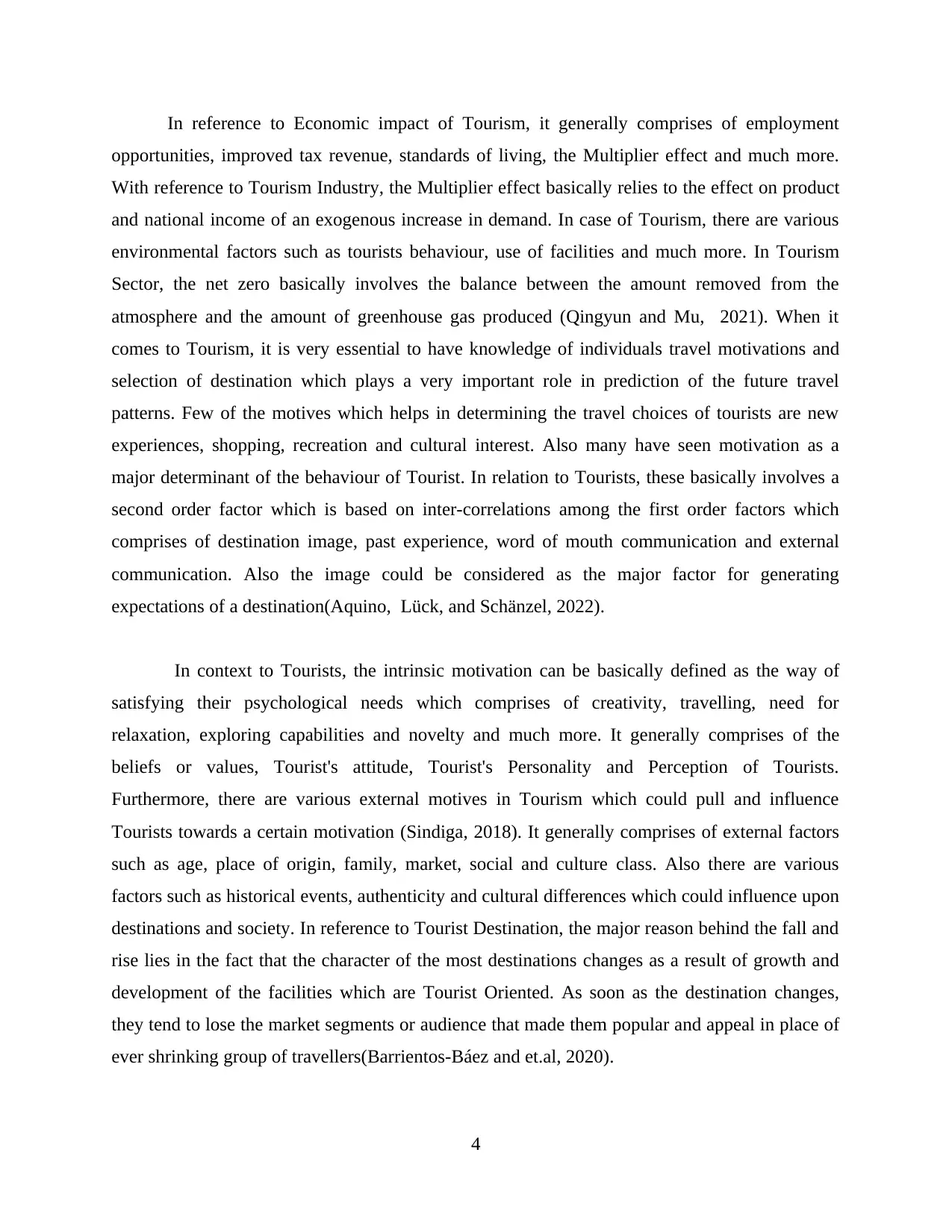
In reference to Economic impact of Tourism, it generally comprises of employment
opportunities, improved tax revenue, standards of living, the Multiplier effect and much more.
With reference to Tourism Industry, the Multiplier effect basically relies to the effect on product
and national income of an exogenous increase in demand. In case of Tourism, there are various
environmental factors such as tourists behaviour, use of facilities and much more. In Tourism
Sector, the net zero basically involves the balance between the amount removed from the
atmosphere and the amount of greenhouse gas produced (Qingyun and Mu, 2021). When it
comes to Tourism, it is very essential to have knowledge of individuals travel motivations and
selection of destination which plays a very important role in prediction of the future travel
patterns. Few of the motives which helps in determining the travel choices of tourists are new
experiences, shopping, recreation and cultural interest. Also many have seen motivation as a
major determinant of the behaviour of Tourist. In relation to Tourists, these basically involves a
second order factor which is based on inter-correlations among the first order factors which
comprises of destination image, past experience, word of mouth communication and external
communication. Also the image could be considered as the major factor for generating
expectations of a destination(Aquino, Lück, and Schänzel, 2022).
In context to Tourists, the intrinsic motivation can be basically defined as the way of
satisfying their psychological needs which comprises of creativity, travelling, need for
relaxation, exploring capabilities and novelty and much more. It generally comprises of the
beliefs or values, Tourist's attitude, Tourist's Personality and Perception of Tourists.
Furthermore, there are various external motives in Tourism which could pull and influence
Tourists towards a certain motivation (Sindiga, 2018). It generally comprises of external factors
such as age, place of origin, family, market, social and culture class. Also there are various
factors such as historical events, authenticity and cultural differences which could influence upon
destinations and society. In reference to Tourist Destination, the major reason behind the fall and
rise lies in the fact that the character of the most destinations changes as a result of growth and
development of the facilities which are Tourist Oriented. As soon as the destination changes,
they tend to lose the market segments or audience that made them popular and appeal in place of
ever shrinking group of travellers(Barrientos-Báez and et.al, 2020).
4
opportunities, improved tax revenue, standards of living, the Multiplier effect and much more.
With reference to Tourism Industry, the Multiplier effect basically relies to the effect on product
and national income of an exogenous increase in demand. In case of Tourism, there are various
environmental factors such as tourists behaviour, use of facilities and much more. In Tourism
Sector, the net zero basically involves the balance between the amount removed from the
atmosphere and the amount of greenhouse gas produced (Qingyun and Mu, 2021). When it
comes to Tourism, it is very essential to have knowledge of individuals travel motivations and
selection of destination which plays a very important role in prediction of the future travel
patterns. Few of the motives which helps in determining the travel choices of tourists are new
experiences, shopping, recreation and cultural interest. Also many have seen motivation as a
major determinant of the behaviour of Tourist. In relation to Tourists, these basically involves a
second order factor which is based on inter-correlations among the first order factors which
comprises of destination image, past experience, word of mouth communication and external
communication. Also the image could be considered as the major factor for generating
expectations of a destination(Aquino, Lück, and Schänzel, 2022).
In context to Tourists, the intrinsic motivation can be basically defined as the way of
satisfying their psychological needs which comprises of creativity, travelling, need for
relaxation, exploring capabilities and novelty and much more. It generally comprises of the
beliefs or values, Tourist's attitude, Tourist's Personality and Perception of Tourists.
Furthermore, there are various external motives in Tourism which could pull and influence
Tourists towards a certain motivation (Sindiga, 2018). It generally comprises of external factors
such as age, place of origin, family, market, social and culture class. Also there are various
factors such as historical events, authenticity and cultural differences which could influence upon
destinations and society. In reference to Tourist Destination, the major reason behind the fall and
rise lies in the fact that the character of the most destinations changes as a result of growth and
development of the facilities which are Tourist Oriented. As soon as the destination changes,
they tend to lose the market segments or audience that made them popular and appeal in place of
ever shrinking group of travellers(Barrientos-Báez and et.al, 2020).
4
⊘ This is a preview!⊘
Do you want full access?
Subscribe today to unlock all pages.

Trusted by 1+ million students worldwide
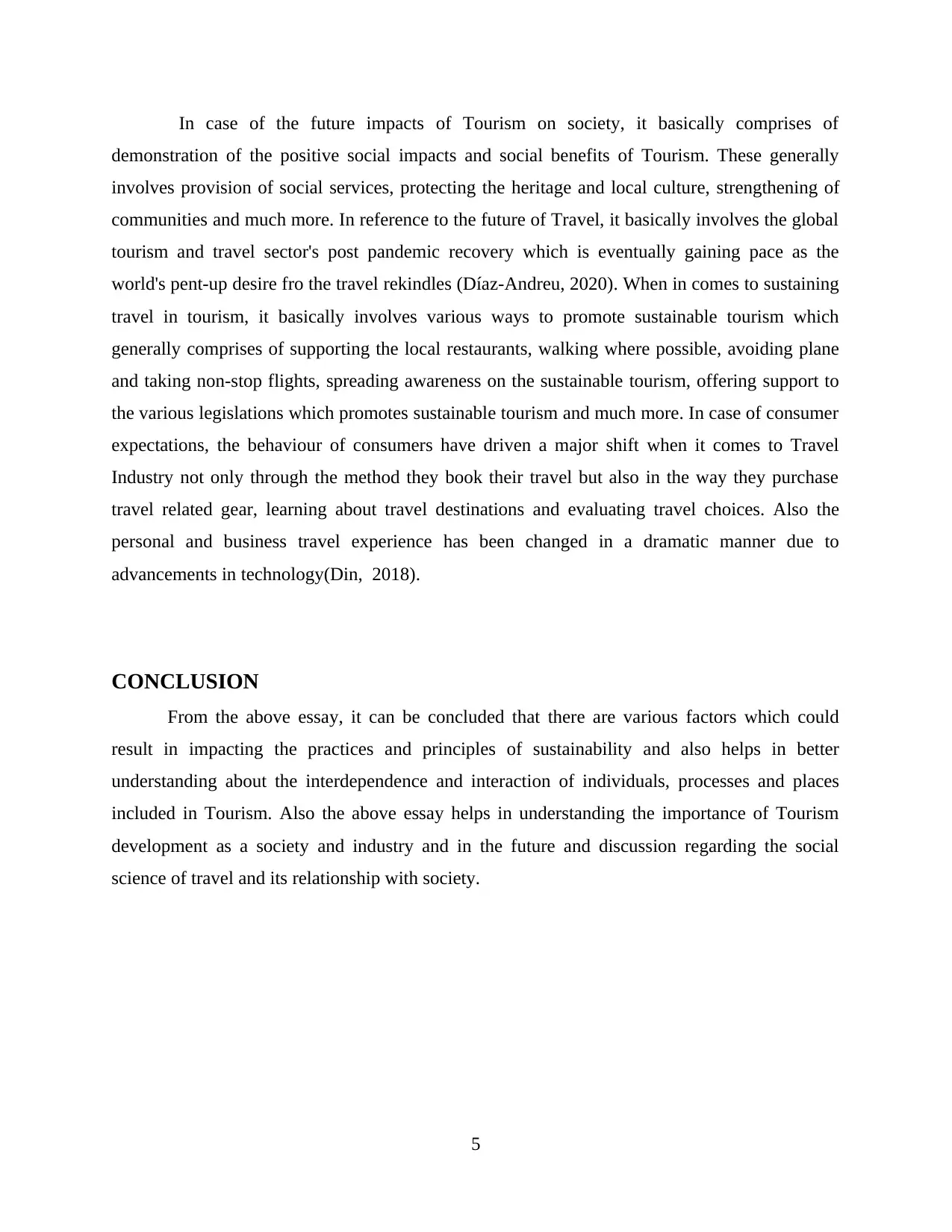
In case of the future impacts of Tourism on society, it basically comprises of
demonstration of the positive social impacts and social benefits of Tourism. These generally
involves provision of social services, protecting the heritage and local culture, strengthening of
communities and much more. In reference to the future of Travel, it basically involves the global
tourism and travel sector's post pandemic recovery which is eventually gaining pace as the
world's pent-up desire fro the travel rekindles (Díaz-Andreu, 2020). When in comes to sustaining
travel in tourism, it basically involves various ways to promote sustainable tourism which
generally comprises of supporting the local restaurants, walking where possible, avoiding plane
and taking non-stop flights, spreading awareness on the sustainable tourism, offering support to
the various legislations which promotes sustainable tourism and much more. In case of consumer
expectations, the behaviour of consumers have driven a major shift when it comes to Travel
Industry not only through the method they book their travel but also in the way they purchase
travel related gear, learning about travel destinations and evaluating travel choices. Also the
personal and business travel experience has been changed in a dramatic manner due to
advancements in technology(Din, 2018).
CONCLUSION
From the above essay, it can be concluded that there are various factors which could
result in impacting the practices and principles of sustainability and also helps in better
understanding about the interdependence and interaction of individuals, processes and places
included in Tourism. Also the above essay helps in understanding the importance of Tourism
development as a society and industry and in the future and discussion regarding the social
science of travel and its relationship with society.
5
demonstration of the positive social impacts and social benefits of Tourism. These generally
involves provision of social services, protecting the heritage and local culture, strengthening of
communities and much more. In reference to the future of Travel, it basically involves the global
tourism and travel sector's post pandemic recovery which is eventually gaining pace as the
world's pent-up desire fro the travel rekindles (Díaz-Andreu, 2020). When in comes to sustaining
travel in tourism, it basically involves various ways to promote sustainable tourism which
generally comprises of supporting the local restaurants, walking where possible, avoiding plane
and taking non-stop flights, spreading awareness on the sustainable tourism, offering support to
the various legislations which promotes sustainable tourism and much more. In case of consumer
expectations, the behaviour of consumers have driven a major shift when it comes to Travel
Industry not only through the method they book their travel but also in the way they purchase
travel related gear, learning about travel destinations and evaluating travel choices. Also the
personal and business travel experience has been changed in a dramatic manner due to
advancements in technology(Din, 2018).
CONCLUSION
From the above essay, it can be concluded that there are various factors which could
result in impacting the practices and principles of sustainability and also helps in better
understanding about the interdependence and interaction of individuals, processes and places
included in Tourism. Also the above essay helps in understanding the importance of Tourism
development as a society and industry and in the future and discussion regarding the social
science of travel and its relationship with society.
5
Paraphrase This Document
Need a fresh take? Get an instant paraphrase of this document with our AI Paraphraser
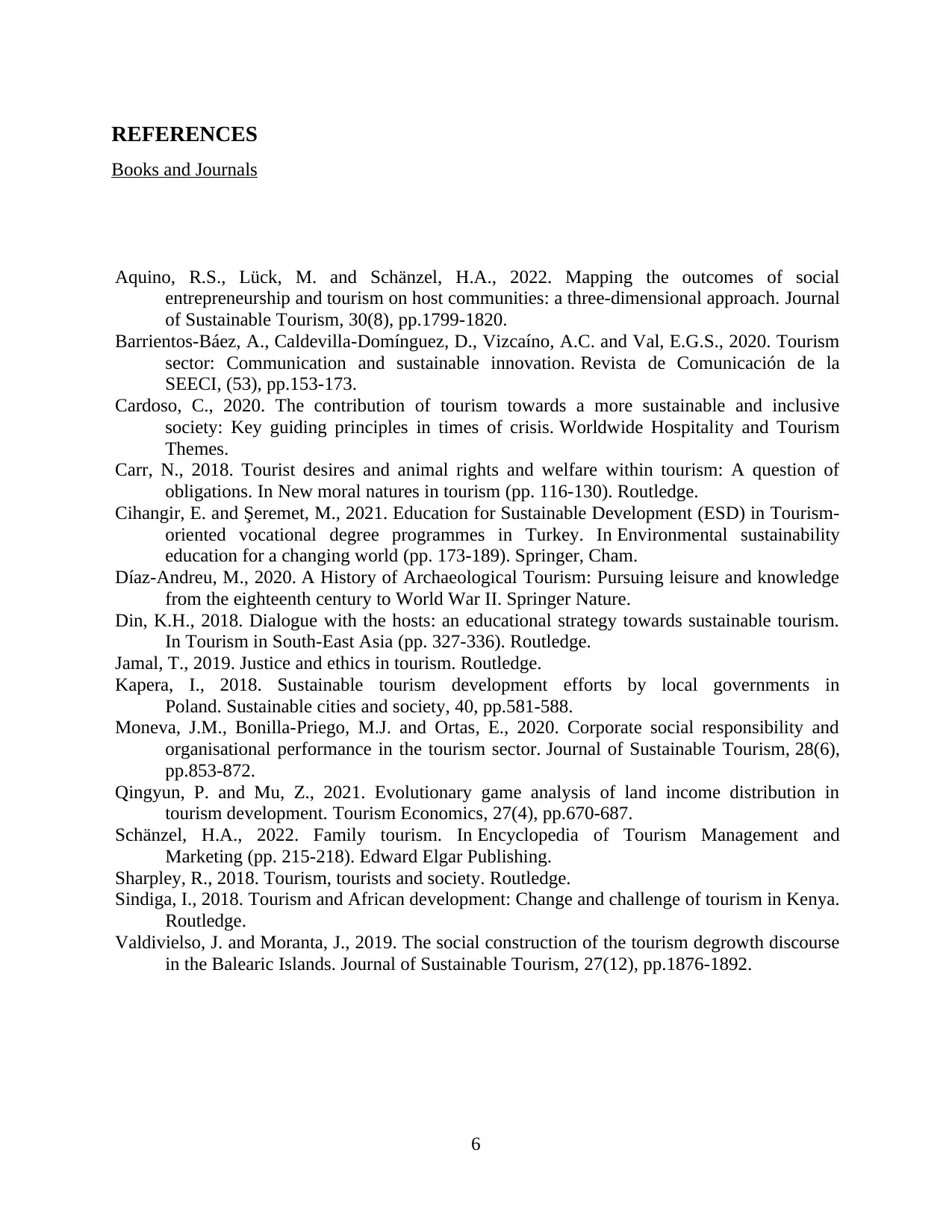
REFERENCES
Books and Journals
Aquino, R.S., Lück, M. and Schänzel, H.A., 2022. Mapping the outcomes of social
entrepreneurship and tourism on host communities: a three-dimensional approach. Journal
of Sustainable Tourism, 30(8), pp.1799-1820.
Barrientos-Báez, A., Caldevilla-Domínguez, D., Vizcaíno, A.C. and Val, E.G.S., 2020. Tourism
sector: Communication and sustainable innovation. Revista de Comunicación de la
SEECI, (53), pp.153-173.
Cardoso, C., 2020. The contribution of tourism towards a more sustainable and inclusive
society: Key guiding principles in times of crisis. Worldwide Hospitality and Tourism
Themes.
Carr, N., 2018. Tourist desires and animal rights and welfare within tourism: A question of
obligations. In New moral natures in tourism (pp. 116-130). Routledge.
Cihangir, E. and Şeremet, M., 2021. Education for Sustainable Development (ESD) in Tourism-
oriented vocational degree programmes in Turkey. In Environmental sustainability
education for a changing world (pp. 173-189). Springer, Cham.
Díaz-Andreu, M., 2020. A History of Archaeological Tourism: Pursuing leisure and knowledge
from the eighteenth century to World War II. Springer Nature.
Din, K.H., 2018. Dialogue with the hosts: an educational strategy towards sustainable tourism.
In Tourism in South-East Asia (pp. 327-336). Routledge.
Jamal, T., 2019. Justice and ethics in tourism. Routledge.
Kapera, I., 2018. Sustainable tourism development efforts by local governments in
Poland. Sustainable cities and society, 40, pp.581-588.
Moneva, J.M., Bonilla-Priego, M.J. and Ortas, E., 2020. Corporate social responsibility and
organisational performance in the tourism sector. Journal of Sustainable Tourism, 28(6),
pp.853-872.
Qingyun, P. and Mu, Z., 2021. Evolutionary game analysis of land income distribution in
tourism development. Tourism Economics, 27(4), pp.670-687.
Schänzel, H.A., 2022. Family tourism. In Encyclopedia of Tourism Management and
Marketing (pp. 215-218). Edward Elgar Publishing.
Sharpley, R., 2018. Tourism, tourists and society. Routledge.
Sindiga, I., 2018. Tourism and African development: Change and challenge of tourism in Kenya.
Routledge.
Valdivielso, J. and Moranta, J., 2019. The social construction of the tourism degrowth discourse
in the Balearic Islands. Journal of Sustainable Tourism, 27(12), pp.1876-1892.
6
Books and Journals
Aquino, R.S., Lück, M. and Schänzel, H.A., 2022. Mapping the outcomes of social
entrepreneurship and tourism on host communities: a three-dimensional approach. Journal
of Sustainable Tourism, 30(8), pp.1799-1820.
Barrientos-Báez, A., Caldevilla-Domínguez, D., Vizcaíno, A.C. and Val, E.G.S., 2020. Tourism
sector: Communication and sustainable innovation. Revista de Comunicación de la
SEECI, (53), pp.153-173.
Cardoso, C., 2020. The contribution of tourism towards a more sustainable and inclusive
society: Key guiding principles in times of crisis. Worldwide Hospitality and Tourism
Themes.
Carr, N., 2018. Tourist desires and animal rights and welfare within tourism: A question of
obligations. In New moral natures in tourism (pp. 116-130). Routledge.
Cihangir, E. and Şeremet, M., 2021. Education for Sustainable Development (ESD) in Tourism-
oriented vocational degree programmes in Turkey. In Environmental sustainability
education for a changing world (pp. 173-189). Springer, Cham.
Díaz-Andreu, M., 2020. A History of Archaeological Tourism: Pursuing leisure and knowledge
from the eighteenth century to World War II. Springer Nature.
Din, K.H., 2018. Dialogue with the hosts: an educational strategy towards sustainable tourism.
In Tourism in South-East Asia (pp. 327-336). Routledge.
Jamal, T., 2019. Justice and ethics in tourism. Routledge.
Kapera, I., 2018. Sustainable tourism development efforts by local governments in
Poland. Sustainable cities and society, 40, pp.581-588.
Moneva, J.M., Bonilla-Priego, M.J. and Ortas, E., 2020. Corporate social responsibility and
organisational performance in the tourism sector. Journal of Sustainable Tourism, 28(6),
pp.853-872.
Qingyun, P. and Mu, Z., 2021. Evolutionary game analysis of land income distribution in
tourism development. Tourism Economics, 27(4), pp.670-687.
Schänzel, H.A., 2022. Family tourism. In Encyclopedia of Tourism Management and
Marketing (pp. 215-218). Edward Elgar Publishing.
Sharpley, R., 2018. Tourism, tourists and society. Routledge.
Sindiga, I., 2018. Tourism and African development: Change and challenge of tourism in Kenya.
Routledge.
Valdivielso, J. and Moranta, J., 2019. The social construction of the tourism degrowth discourse
in the Balearic Islands. Journal of Sustainable Tourism, 27(12), pp.1876-1892.
6
1 out of 8
Related Documents
Your All-in-One AI-Powered Toolkit for Academic Success.
+13062052269
info@desklib.com
Available 24*7 on WhatsApp / Email
![[object Object]](/_next/static/media/star-bottom.7253800d.svg)
Unlock your academic potential
Copyright © 2020–2026 A2Z Services. All Rights Reserved. Developed and managed by ZUCOL.



